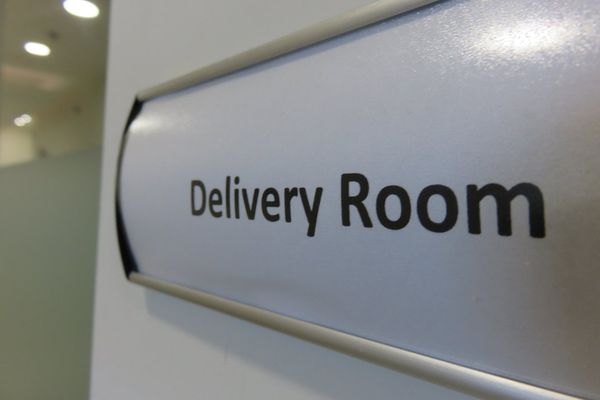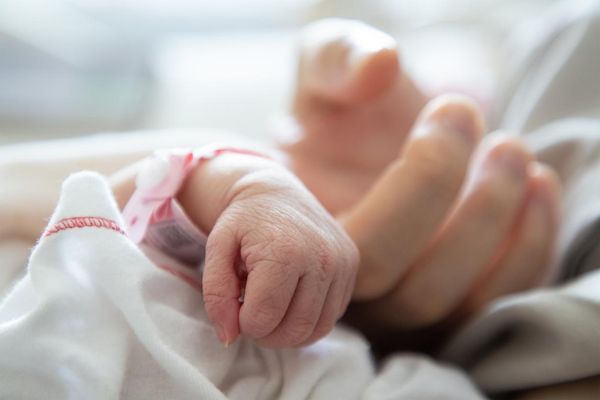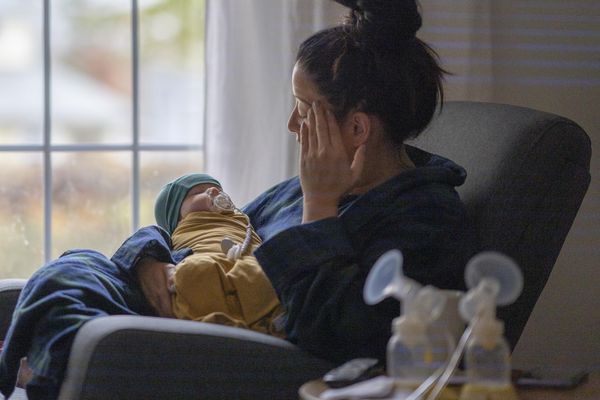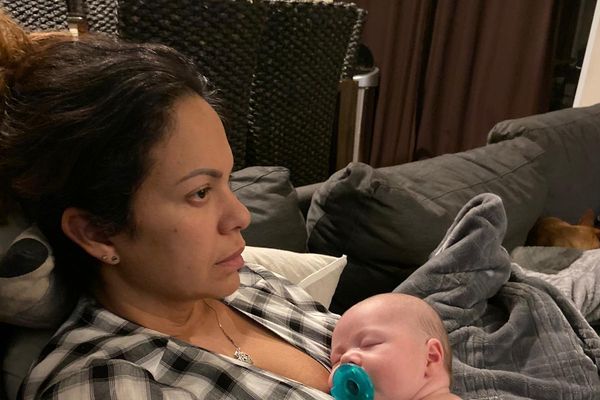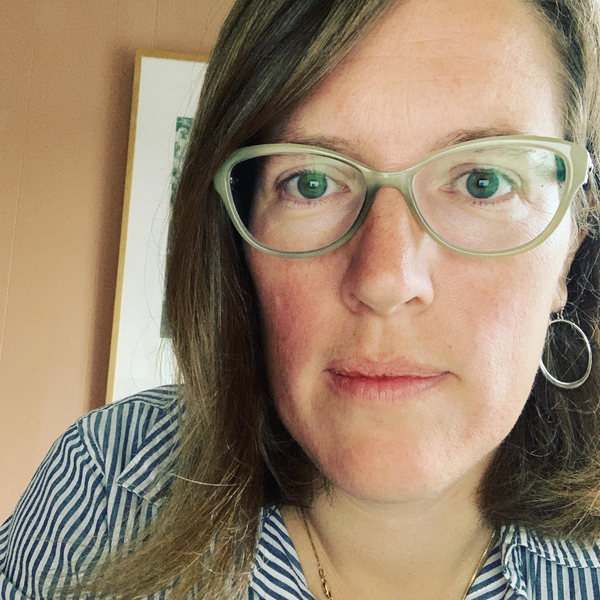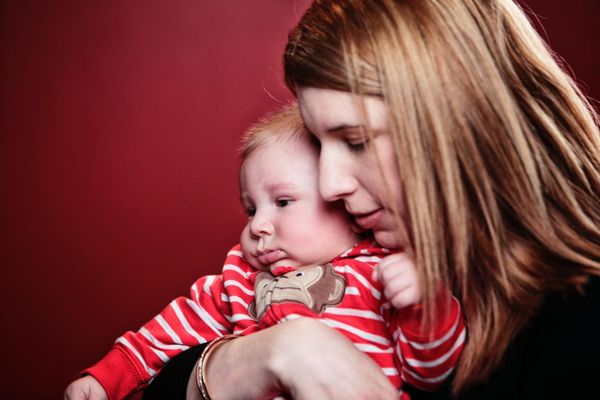By Jennifer Ford
This story is part of our Real Women, Real Stories series, documenting the lived experiences of women along their health journeys. Please always consult your health care professional with personal concerns or questions.
I've struggled with depression since I was in high school. When I was 18, my doctor prescribed medication to manage my symptoms, and in college I started seeing a therapist, which also helped my wellbeing. I learned tools to cope with everyday challenges, and my mental health was stable throughout my twenties.
Then my husband and I decided to start a family in 2011. I was ready and excited for my first pregnancy. At my provider's recommendation, I tapered off my antidepressant before I got pregnant. I made it through my first trimester, but I felt miserable, unable to handle the sadness and anxiety consuming my days. My doctor suggested restarting my antidepressant, since my mood disorder was more likely to negatively impact my pregnancy than the medication. The next two trimesters were relatively uneventful, and our daughter Addison was born healthy, albeit tiny at only 5 lbs, in February of 2012.
Things were very different for my second pregnancy. With only one child, I'd been happy and content, enjoying time with my busy toddler. But life became increasingly stressful. In October of 2013, our friends lost their 6-year-old daughter. I couldn't stop thinking about how selfish I was being, depriving Addison of a sibling and my husband of another child. I threw away my birth control that night. Sadly, in November 2013, my beloved father-in-law passed away from cancer. Two days later, I discovered I was pregnant.
Paralyzed by grief, I wasn't as emotionally invested in this pregnancy. Somehow I made it through to full term. I was 4 days past my due date when I finally went into labor, a long, challenging experience which ended in an emergency C-section due to fetal distress.
Mckinley was born in August, 2013, healthy despite her stressful birth. The problem was that she looked very different from Addison, and I questioned if she was truly my baby. She was, but already I was in a difficult mental state. I don't remember much of my hospital stay, and when I returned home, the house didn't feel quite right. I was overcome by feelings of grief and loss, as well as a powerful sense of guilt and self-blame. I wasn't able to bond with Mckinley. I went through the motions of taking care of her, feeding her and changing her on autopilot, but nothing more.
One afternoon I was folding laundry in the nursery, Mckinley next to me in the bouncy seat that had been Addison's. Suddenly, I grew very upset and took Mckinley out of the seat and laid her on the floor. I was irrationally angry that the baby was taking something that didn't belong to her. At that moment, I felt like she hadn't done anything to deserve her sister's seat. She fussed on the floor next to me as I continued to fold laundry. That night, I told my husband how desperate I was feeling. I admitted that I wanted my misery to go away, and that I'd considered taking all the leftover pain meds from my c-section. He realized the situation was urgent and made an appointment for me to see my OB-GYN the next day.
In the office, Dr. Conlan had me fill out the Edinburg Postnatal Depression Scale and contacted the newly-launched MCPAP (Massachusetts Child Psychiatry Access Program) for Moms. Through this program, he was able to get me an immediate psychiatric consult over the phone and prescribe me a different medication. The next day, I was matched with a social worker who helped me navigate the newly-instituted MCPAP resources. I started going to weekly group therapy with other new mothers, and soon got a complete psychiatric evaluation. Dr. Conlan insisted that I come see him every Friday, despite his busy schedule. It helped tremendously to know that he cared deeply about my well-being. I believe that Dr. Conlan's compassion had a huge impact on my recovery.
Thankfully, after a few weeks of treatment, I began to function again. I was able to do small things, like my make-up and hair. At 12 weeks postpartum, I had scheduled a family photo shoot. This was a milestone, because I remember looking at Mckinley and thinking how cute she was, a feeling I hadn't had before. This moment gave me confidence that I was healing.
When Mckinley was 7 months old, I became involved with a nonprofit called Postpartum Progress. I began to attend conferences about PPD with my fellow "Warrior Moms," where we'd learn about the latest treatments and statistics surrounding maternal mental health. Now, when people ask me about my story, I always tell them that MCPAP for moms, Postpartum Progress, and of course, Dr. Conlan, saved my life.
Today my beautiful daughters are 5 and 8, and I'm doing exceptionally well. I continue to manage my mood disorder with therapy and medication. I'm grateful to have survived those terrifying months of PPD and still offer support to other mothers who are struggling. I'm open about my experiences on social media and urge people to contact me if they know someone who may be depressed or are depressed themselves. Over the past few years, countless new moms have confided in me and asked for advice. I always applaud them for reaching out and making that first, most difficult step towards recovery. I tell them, "You can't pour from an empty cup. You must care for yourself before you can care for anyone else."
Jenn Ford lives on a small hobby farm in Oakham, MA with her husband Andrew and their two daughters. She helps manage her father's construction company, has her real estate license, and operates her own homemade soy candle company. Jenn devotes as much time as possible to postpartum depression advocacy work.
- When Postpartum Depression Hit, I Heard Only the Lies My Depression Told Me - HealthyWomen ›
- New Moms Are Busy Checking on Their Babies. But Is Anyone Checking on Them? - HealthyWomen ›
- I Lost My Daughter to Postpartum Depression - HealthyWomen ›
- Having Another Baby After Postpartum Depression - HealthyWomen ›
- Living with Postpartum Depression - HealthyWomen ›
- My Journey From Postpartum Depression and Back to Health - HealthyWomen ›


